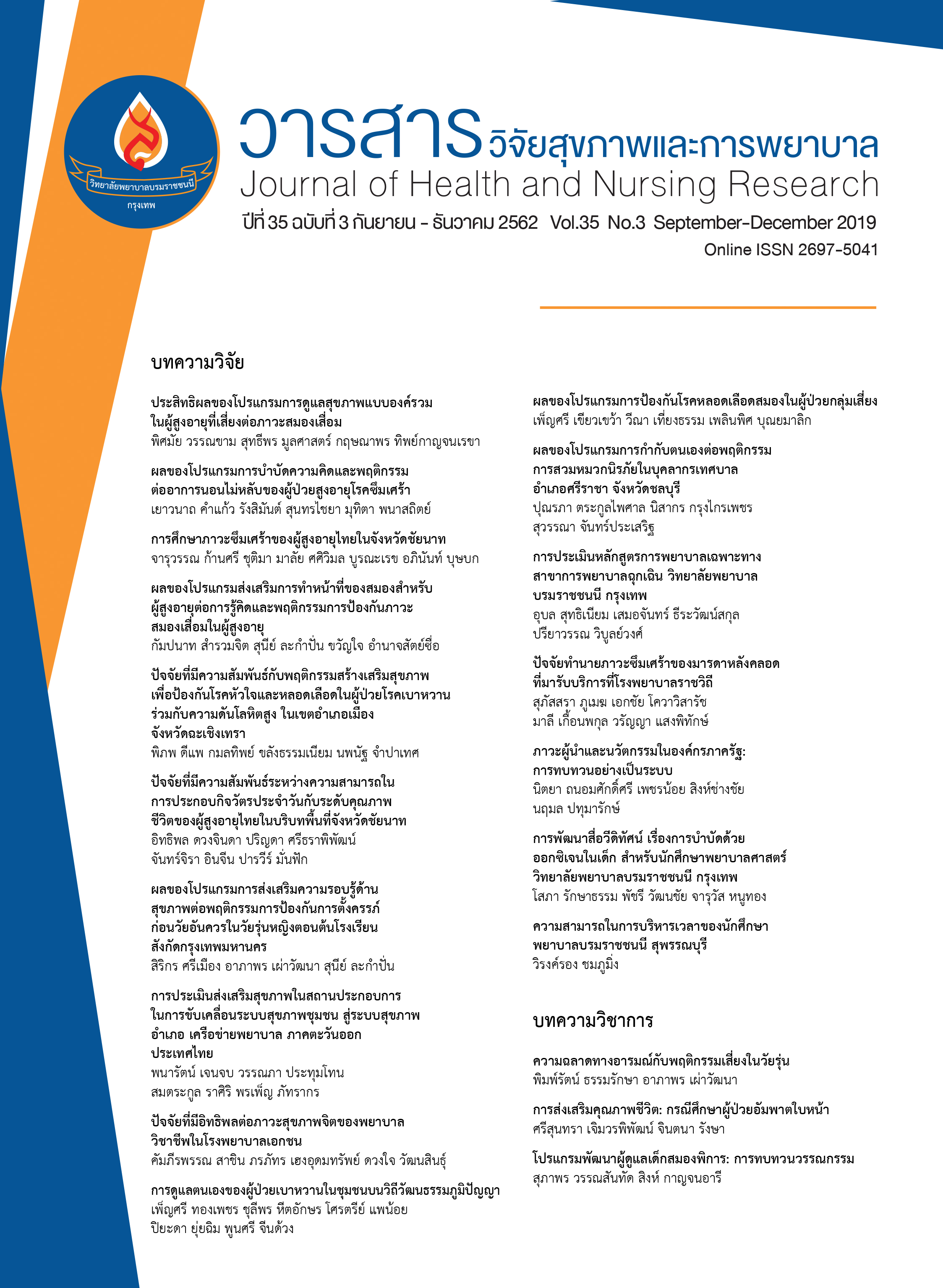ความฉลาดทางอารมณ์กับพฤติกรรมเสี่ยงในวัยรุ่น
คำสำคัญ:
ความฉลาดทางอารมณ์, พฤติกรรมเสี่ยง, วัยรุ่นบทคัดย่อ
ความฉลาดทางอารมณ์ (Emotional intelligence) เป็นปัจจัยหนึ่งที่มีความสัมพันธ์กับการทำพฤติกรรมเสี่ยงของวัยรุ่น กล่าวคือ วัยรุ่นที่มีความฉลาดทางอารมณ์อยู่ในระดับต่ำจะมีโอกาสทำพฤติกรรมเสี่ยงมากกว่าวัยรุ่นที่มีความฉลาดทางอารมณ์อยู่ในระดับสูง เนื่องจากวัยรุ่นที่มีความฉลาดทางอารมณ์ดี จะสามารถรับรู้และเข้าใจอารมณ์ของตนเองที่เกิดขึ้นตามความเป็นจริง สามารถควบคุมอารมณ์ มีการคิดพิจารณา และตัดสินใจที่ดีว่าตนเองจะจัดการกับอารมณ์ที่เกิดขึ้นนั้นอย่างไรให้มีความเหมาะสมที่สุด แต่ในทางตรงกันข้าม หากวัยรุ่นมีความฉลาดทางอารมณ์ที่ไม่เหมาะสม วัยรุ่นจะไม่สามารถจัดการกับอารมณ์ของตนเองได้ และจะแสดงออกผ่านการทำพฤติกรรมที่ไม่เหมาะสม เช่น การใช้สารเสพติด การมีเพศสัมพันธ์ก่อนวัยอันควร เป็นต้น ซึ่งปัจจัยที่มีผลต่อความฉลาดทางอารมณ์ของวัยรุ่น แบ่งได้ 3 ระดับ คือ 1) ปัจจัยระดับบุคคล ได้แก่ เพศ ผลสัมฤทธิ์ทางการเรียน 2) ปัจจัยระดับครอบครัว ได้แก่ การเลี้ยงดูของครอบครัว และ 3) ปัจจัยระดับสังคม คือ สังคมและวัฒนธรรม ดังนั้น การพัฒนาความฉลาดทางอารมณ์ในวัยรุ่นเป็นสิ่งสำคัญ โดยต้องการการมีส่วนร่วมทั้งจากวัยรุ่น ครอบครัว และสังคม เพื่อช่วยให้วัยรุ่นเข้าใจอารมณ์ของตนเอง และสามารถควบคุมอารมณ์ได้อย่างเหมาะสมกับสถานการณ์จริงที่เกิดขึ้น เป็นการสร้างภูมิคุ้มกันและเป็นเกราะป้องกันจากเหตุการณ์ต่าง ๆ ที่เข้ามากระทบต่อจิตใจของวัยรุ่น และทำให้เกิดการทำพฤติกรรมเสี่ยงต่าง ๆ ในวัยรุ่นตามมา
Downloads
เอกสารอ้างอิง
2. Tuntipiwattanasakul P. Mental health survey of Thai population in the year 2009. 2010 [cited 2019 Mar 9] Available from http://www.thaihealth.or.th/healthcontent/news/12239. (in Thai).
3. Sangsuksai D. Emotional quotient (EQ) in adolescents. 2015 [cited 2019 Feb 19] Available from http://www/dmh.go.th/1667/1667view.asp?id=3928. (in Thai).
4. Brackett MA, Mayer JD. Convergent, discriminant, and incremental validity of competing measures of emotional intelligence. Personality and Social Psychology Bulletin 2003;29:1147-58.
5. Department of Mental Health, Ministry of Public Health. EQ: Emotional quotient. Nonthaburi Province, Ministry of Public Health; 2000. (in Thai).
6. Tobacco Control Research and Knowledge Management Center. Situation of consumer consumption control of tobacco country of Thailand in the year 2016. Bangkok: Chareondeemankong Printing; 2016. (in Thai).
7. National Statistical Office Thailand. Summary of the key survey behavioral disorders, smoking and alcohol use of population in the year 2014. Bangkok: National Statistical Office Thailand; 2015. (in Thai).
8. Ministry of Social Development and Human Security. Statistics of teen childbirth Thailand in the year 2015. Bangkok: Information and Communication Technology Center; 2016. (in Thai).
9. Jannual N, Surbsamlan P. The situation of smoking behavior among staff and students at Ubon Ratchathani University: smoke free Ubon Ratchathani University project. Journal of Science & Technology Ubon Rartchathani University 2016;18(2):1-10. (in Thai).
10. Phonchai B. Sexual behavior of students in grade 11 in a secondary school in Nakhon phanom district. Journal of Prapokklao Hospital Clinical Medical Education Center 2011;28(4):230–37. (in Thai).
11. Onmoy P. The first time alcohol consumption and drinking heavily of adolescents at Auttaradit Province. Public Health Journal 2011;41(3):250-61. (in Thai).
12. Aingkathaworrawong T. etal. Sexual risk behavior of female adolescents in vocational schools. Songklanagarind Medical Journal 2007;25(6):511-20. (in Thai).
13. Srisupa K. The effect of strengthening the emotional intelligence based on the concept of Goleman towards reducing aggressive behavior and violence of students grade 6. Dissertation of master degree of Education Program in Elementary Education, Faculty of graduate studies, Chulalongkorn University. (in Thai).
14. Goleman D. Emotional intelligence. New York: Bantam Dell; 2005.
15. Steinberg L. Adolescence. 3rd ed. New York: McGraw Hill; 2003.
16. Department of Mental Health, Ministry of Public Health. Survey of IQ and EQ situation in Thai school age children [Internet]. 2015 [cited 2015 Dec 20]. Available from: http://www.mhcr1.go.th
17. Thammaraksa P, Powwattana A, Lagampan S, Vatanasomboon P, Stoddard S. School-Based participation program to prevent multiple risk behaviors in male secondary school students. Doctor of Public Health. Faculty of Graduate Studies, Mahidol University; 2018. (in Thai).
18. Trinidad DR, Johnson CA. The association between emotional intelligence and early adolescent tobacco and alcohol use. Personality and Individual Differences 2001;32:95-105.
19. Patanavanichanun N, Sirivattana R. The relationship between emotional quotient and sexual behaviors of adolescents in the third official border. Journal of Nursing Science 2007;25(3):56-67. (in Thai).
20. Puangpila Y, Kachantorn S, Chirawut K, Pragobsang B. Factors affected to emotional quotient among secondary school students in Warinchamrab District, Ubon Ratchathani Province. The 13th Mahasarakham University Research Conference; 2017. (in Thai).
21. Srinual C. Emotional intelligence of students grade 6 of school in Office of the Basic Education Commission: OBEC. [Internet]. 2011 [cited 2012 Mar 20]. Available from: http:// http://www.riclib.nrct.go.th/scripts. (in Thai).
22. Ramajitti Institute and Rajanukul. IQ/EQ watch research project. [Internet]. 2018 [cited 2019 Jul 2].Available from: http://rajanukul.go.th/new/_admin/download/5-4462-1448597653.pdf. (in Thai).
23. Tasana K. Influence of parenting, Emotional intelligence, and study habits towards education achievement of student’s in Ramkhamhaeng University. Faculty of Education, Ramkhamhaeng University; 2009. (in Thai).
24. Mhankitgan K. The relationship between some factors and emotional quotient and adversity quotient of mattayomsuksa II students in Bangkok Education Service Area 1. Master of Education degree in Educational research and statistics, Srinakharinwirot University; 2007. (in Thai).
25. Lim N. Cultural differences in emotion: differences in emotional arousal level between the east and the west. Integrative Medicine Research 2016;5(2):105-9.
26. Poomsanguan K, Paikoh K. Nurses and development of emotional quotient. Journal of the Royal Thai Army Nurses 2014;15(3):18-23. (in Thai).
27. Horton-Deuthch S, Sherwood G. Reflection: An educational strategy to develop emotionallycompetent nurse leaders. Journal of Nursing Management 2008;16(8):946-54.
28. Paiboontananon J, Petpichetchian W, Wannasuntas S. The ways towards improvement of emotional intelligence in the nursing profession. Journal of Boromarajonani College of Nursing, Bangkok 2019;35(1):1-10. (in Thai).
29. Rosaen C, Benn R. The experience of transcendental meditation in middle school students: A Qualitative Report 2006;2:422-5.
30. Meemunggij S. Effects of the Johari Window’s activities on emotional quotient development of matthayomsuksa five students at Darasamut school. Master of Education Program in Educational Administration, Faculty of Education, Burapha University. (in Thai).
31. Mangkang A. Effect of group activity on emotional quotient of Mattayomsuksa 6 students at Chonkanyanukoon School, Chonburi Province: A Preliminary study. HCU Journal 2014;16(32):53-72. (in Thai).
32. Markham T. Effects of positive emotional refocusing on emotional intelligence and autonomic recovery from stress in high school students. [Internet]. 2004 [cited 2019 July 4]. Available from: http://proquest.umi.com/pqdweb. (in Thai).
33. Chulakarn N, Phaitakoon J, Lagampan S. Emotional intelligence development in adolescents by applying principles of Buddhist. Journal of Public Health Nursing 2015;29(1): 132-43.
34. Yimkhlib S. Effect of promoting self- esteem by participatory learning process on emotional intelligence among early adolescents in Nonthaburi Province. Unpublished master’s thesis, Master of Science (Public Health), Faculty of Graduate Studies, Mahidol University, Bangkok, Thailand; 2006.
(in Thai).
35. Hindes Y. Thorne KJ, Schwean VL, McKeough AM. Promoting intrapersonal qualities in adolescents: evaluation of rapport’s teen leadership breakthrough program. Canadian Journal of School Psychology 2008;23:206.
36. Prommala W. The emotional quotient of nursing students private university in Pathumthani Province. SSRU Graduate Studies Journal 2014;2(2):432-38. (in Thai).
ดาวน์โหลด
เผยแพร่แล้ว
รูปแบบการอ้างอิง
ฉบับ
ประเภทบทความ
สัญญาอนุญาต
บทความที่ได้รับการตีพิมพ์ เป็นลิขสิทธิ์ของวารสารวิจัยสุขภาพและการพยาบาล (วิทยาลัยพยาบาลบรมราชชนนี กรุงเทพ) ไม่สามารถนำไปตีพิมพ์ซ้ำในวารสารฉบับอื่น


















